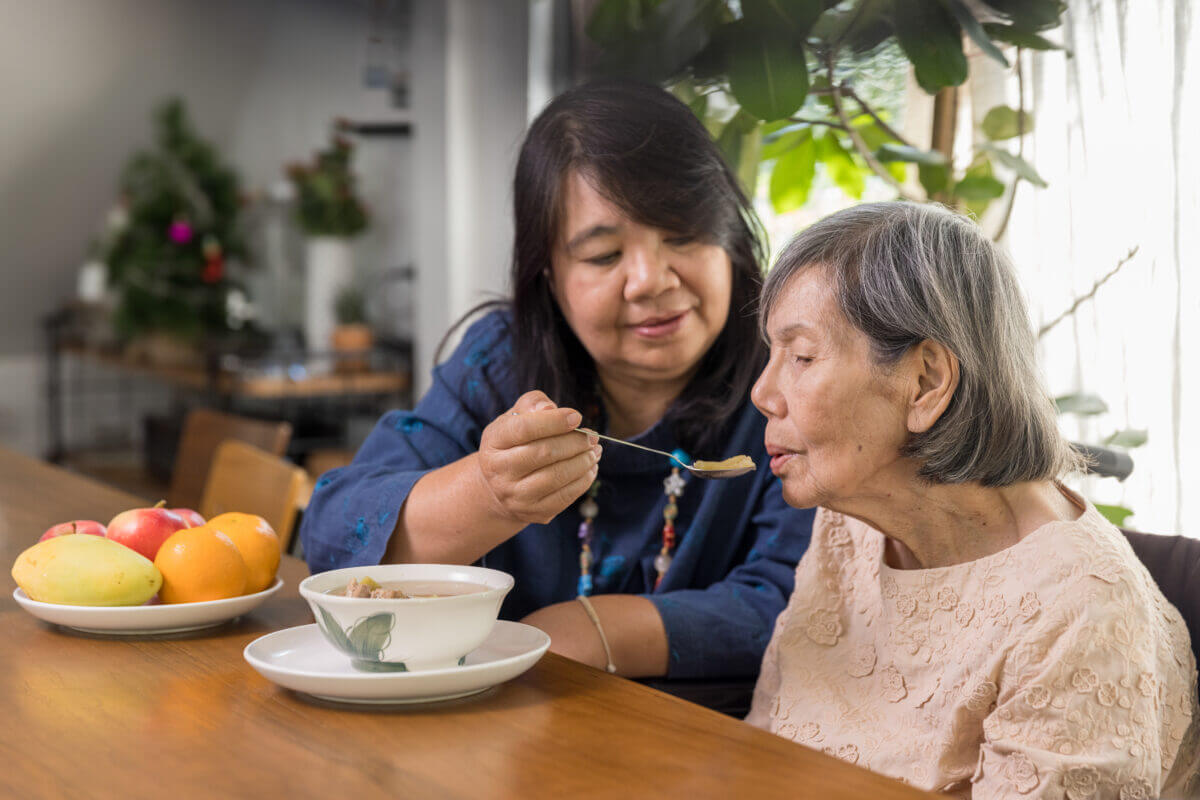
While they’re busy caring for everyone else, are they being cared for?
Even before the pandemic, home caregivers were easing the burden on the healthcare system by volunteering billions of hours to provide care for adults in their own homes. While decreasing the burden on hospitals, they may be increasing the burden on themselves, shouldering an even larger burden during the pandemic. Studies show that those caring for someone challenged with dysphagia have an even higher risk of excess caregiver burden.
Prolonged stress and burden can have serious consequences. Caregivers during the pandemic face a larger burden than normal, which can lead to increased physiological and psychological risk. How can caregivers cope with their own mental and physical health in this situation?
Karen Sheffler, MS, CCC-SLP, BCS-S, shares some helpful tips for caregivers to keep their mental and physical health in check while caring for others, offers a screening tool to spot excess burden symptoms in caregivers, and provides a list of resources for more support.
Caregiver Burden
As stated by Dr. Ashwini Namasivayam-MacDonald in the article Caring for Caregivers During the COVID-19 Crisis and Beyond, while effects and symptoms may differ from person to person, studies note common predictors of caregiver burden (Shune & Namasivayam-MacDonald, 2020):
- Spousal caregivers of older adults with dysphagia are more likely to experience emotional burden than caregivers of spouses without dysphagia.
- Whereas, those caring for their aging parents are more likely to experience BOTH physical and emotional burden.
- Caregivers who are female are more likely to experience symptoms of caregiver burden.
- Caregivers who are dealing with health issues of their own have an increased risk of caregiver burden.
What does this mean?
While some of these situations and symptoms may be unavoidable, knowing you’re at an increased risk of caregiver burden can enable you to be proactive about seeking out solutions to ease the mental and physical toll that may arise.
Tips For Reducing the Burden
Screen yourself for caregiver burden
- Based on your own unique experiences caring for a person with a swallowing disorder, please complete this checklist that explores the functional changes and emotions that you have had over the past month. See The Caregiver Analysis of Reported Experiences with Swallowing Disorders (CARES) to answer yes/no questions regarding if a situation has bothered you or been true for you. This was created and generously shared by Dr. Samantha Shune of University of Oregon and Dr. Ashwini Namasivayam-MacDonald of McMaster University in Ontario, Canada.
- Based on your results of CARES, reach out to the speech-language pathologist who is working with your loved one/person with dysphagia. If these statements of caregiver burden are true for you, please reach out to the medical and mental health professionals involved.
Seek professional support
- If you’re feeling overwhelmed, speak to your primary care physician. They may refer you to a social worker, psychologist, and/or counselor who can help you work through your emotions and offer additional resources and support.
Don’t hesitate to reach out to clinicians and healthcare providers
- Uncertainty can add additional stress to your life. If there’s something in your care recipient’s treatment plan that you’re unsure of, reach out for clarity! Caregivers should also ask about resources to help guide them in their role.
Lean on your social networks
- Caregiver burden research has shown that caregivers benefit from support from their social networks; It’s important that caregivers connect with family and friends outside of the home (or virtually).
Advocate for dysphagia evaluations that include instrumental testing
- Tests such as videofluoroscopic swallow studies (VFSS) or fiberoptic endoscopic evaluations of swallowing (FEES) can help you learn more about your loved one’s dysphagia and aspiration risks. Attend these appointments, watch the studies, and ask questions to get a more complete understanding of your loved one’s condition. Learn if exercises could rehabilitate the swallow function and what strategies compensate for the problem to improve safety and quality of life.
Converse with the medical team and ask for education that suits you best
- Don’t be afraid to ask questions and request time for sit down conversations with the medical team. As a caregiver, you and your loved one are part of the medical team. When learning, ask the healthcare professionals for information in a way that’s easiest for you to digest (e.g. via a professional interpreter and using visuals to aid in understanding). Make sure your healthcare provider gives you recommendations in writing and without too much jargon, as it’s hard to remember everything while you’re doing so much.
Additional Caregiver Resources
You’re not alone in this journey. While it may seem overwhelming at times, there are resources available to help ease the burden. These organizations and tools can provide more information and support:
- CARES Screening Tool
- Family Caregiver Alliance
- National Alliance for Caregiving
- Caring Across Generations
- Hilarity for Charity
- A Caregiver’s Guide for Family and Loved Ones
- Hormel Health Labs COVID FAQs
- National Foundation of Swallowing Disorders
- Dysphagia Outreach Project
To learn more about the important issue of caregiver burden, or to get additional information on how healthcare professionals can help ease the stress on caregivers, read Karen Sheffler’s full resource, co-written by researchers Samantha Shune, PhD, CCC-SLP & Ashwini Namasivayam-MacDonald, PhD, SLP(C), CCC-SLP, Reg. CASLPO. (https://swallowstudy.com/caring-for-caregivers-during-covid-19-crisis-beyond/).
For further reading, visit https://swallowstudy.com/june-is-dysphagiaawareness-month/ for a gallery of caregiver and caregiver burden statistics.
Reference List
Namasivayam-MacDonald, A.M. & Shune, S.E. (2018). The Burden of Dysphagia on Family Caregivers of the Elderly: A Systematic Review. Geriatrics. 3(2), 30.
https://doi.org/10.3390/geriatrics3020030
https://www.ncbi.nlm.nih.gov/pmc/articles/PMC6319247/
Namasivayam-MacDonald, A.M. & Shune, S.E. (2019). The influence of swallowing impairments as an independent risk factor for burden among caregivers of aging parents: A cross-sectional study. Geriatric Nursing. Advance online publication.
https://doi.org/10.1016/j.gerinurse.2019.06.008
Shune S.E., Namasivayam-MacDonald, A.M. (2020). Swallowing Impairments Increase Emotional Burden in Spousal Caregivers of Older Adults. J Appl Gerontol., 39(2), 172‐180. doi:10.1177/0733464818821787.